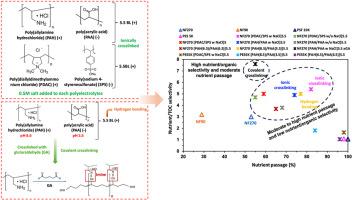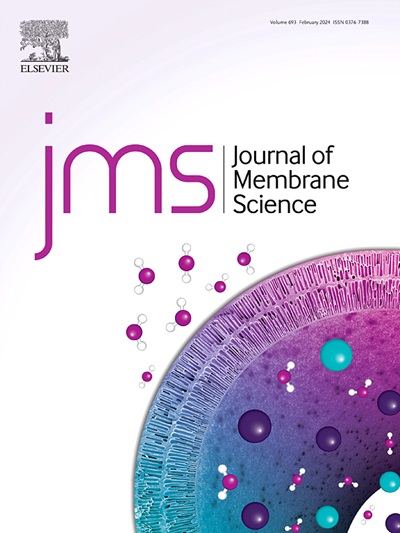Elucidating organic and nutrient transport mechanisms in polyelectrolyte modified membranes for selective nutrient recovery
IF 8.4
1区 工程技术
Q1 ENGINEERING, CHEMICAL
引用次数: 0
Abstract
This work focuses on understanding and analyzing the transport mechanisms of organics and nutrient ions (NH4+, K+) through polyelectrolyte-based membranes, aimed at the selective recovery of nutrients from nutrient-rich resources such as anaerobic digestate. In this study, commercial nanofiltration (NF) membranes were modified by the layer-by-layer (LbL) deposition of oppositely charged polyelectrolytes, utilizing a wide range of parameters such as polyelectrolyte type, deposition pH, salt (NaCl) concentration, polymer cross-linking, etc. Such modifications resulted in membranes exhibiting characteristics that indicate a trade-off relationship between nutrient passage and nutrients/organics selectivity. Our findings suggest that nutrient passage is primarily facilitated by surface charge, while size-exclusion plays a vital role in retaining the organics. Ionically crosslinked polyelectrolyte multilayer (PEM) membranes exhibit superior nutrient passage (up to ∼30 % higher) compared to commercial NF membranes, while covalently crosslinked PEM membranes achieve higher (∼12 % higher) organics rejection. In addition, membranes with such covalent crosslinking exhibit intra-nutrient (NH4+/K+) selectivity of ∼1.8, when tested with binary NH4+/K+ mixtures – a rather surprising membrane property, since both ions have similar hydrated radii. This study provides a fundamental framework of membrane design for selectively recovering nutrients from a variety of nutrient-rich sources.

阐明用于选择性养分回收的聚电解质改性膜中的有机物和养分输送机制
这项工作的重点是了解和分析有机物和营养离子(NH4+、K+)通过基于聚电解质的膜的传输机制,目的是从富含营养物质的资源(如厌氧沼渣)中选择性地回收营养物质。在这项研究中,通过逐层(LbL)沉积带相反电荷的聚电解质对商用纳滤膜进行了改性,利用了多种参数,如聚电解质类型、沉积 pH 值、盐(NaCl)浓度、聚合物交联等。这种改性使膜表现出的特性表明,营养物质通过率与营养物质/有机物选择性之间存在权衡关系。我们的研究结果表明,营养物质的通过主要是由表面电荷促进的,而尺寸排阻在保留有机物方面起着至关重要的作用。与商业 NF 膜相比,离子交联聚电解质多层膜(PEM)的营养物通过率更高(高出 30%),而共价交联 PEM 膜的有机物去除率更高(高出 12%)。此外,当使用二元 NH4+/K+ 混合物进行测试时,具有这种共价交联的膜表现出营养物(NH4+/K+)内选择性∼1.8--这是一种相当令人惊讶的膜特性,因为这两种离子具有相似的水合半径。这项研究为从各种富含营养物质的来源中选择性回收营养物质的膜设计提供了一个基本框架。
本文章由计算机程序翻译,如有差异,请以英文原文为准。
求助全文
约1分钟内获得全文
求助全文
来源期刊

Journal of Membrane Science
工程技术-高分子科学
CiteScore
17.10
自引率
17.90%
发文量
1031
审稿时长
2.5 months
期刊介绍:
The Journal of Membrane Science is a publication that focuses on membrane systems and is aimed at academic and industrial chemists, chemical engineers, materials scientists, and membranologists. It publishes original research and reviews on various aspects of membrane transport, membrane formation/structure, fouling, module/process design, and processes/applications. The journal primarily focuses on the structure, function, and performance of non-biological membranes but also includes papers that relate to biological membranes. The Journal of Membrane Science publishes Full Text Papers, State-of-the-Art Reviews, Letters to the Editor, and Perspectives.
 求助内容:
求助内容: 应助结果提醒方式:
应助结果提醒方式:


